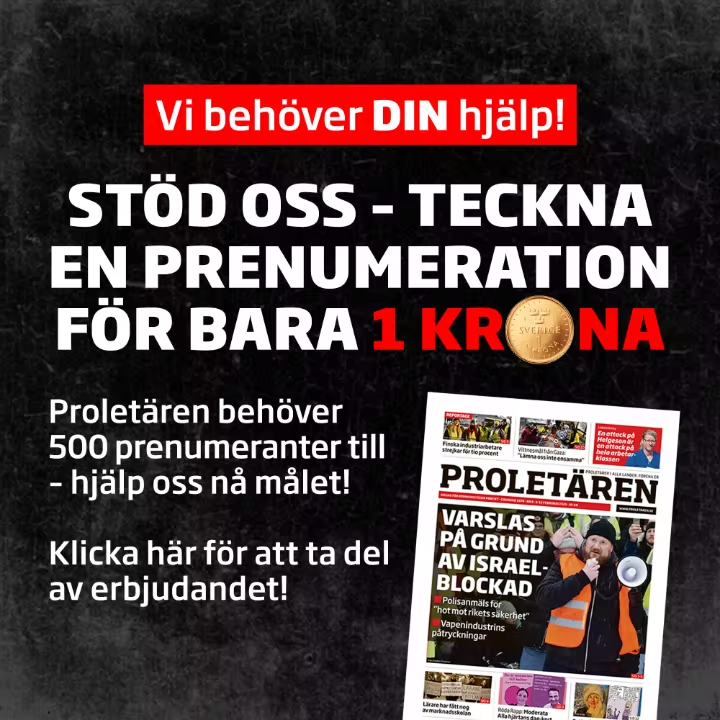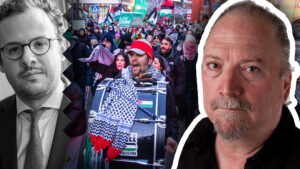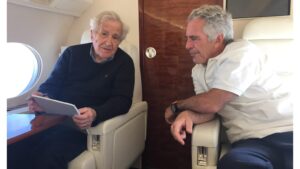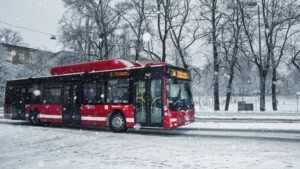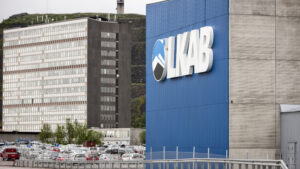On March 4th the Proletaren received an e-mail from the Ministry of Foreign Affairs about Swedish aid to Syria. It was the answer to a request made eight months earlier to get all the documents concerning Swedish aid to the Syrian National Council (SNC) and other Syrian organizations operating in Syria or in exile.
In the answer from the Ministry of Foreign Affairs there was an appendix of 53 pages. The content is partly classified. In some cases single words are missing, in other cases entire paragraphs have been removed. A number of pages are blank.
We are told for example that on July 30th 2012 the Ministry drafted the report “Request of financial aid”. The rest of the paper is white. We don’t know what organization made the request, nor what the answer was.
The motivation for this is that secrecy will prevail when the content “concerns another country or Sweden’s relations to another country, or to an international organization or authority, and when exposing the content may harm Sweden or its international relations”.
In spite of all this, the documents we have obtained are revealing.
They expose Sweden’s involvement and guilt in the Syrian tragedy. They show how Sweden attends meetings with some of the worst dictatorships in the world, discussing how to provide the popular support to Syrian leaders in exile which they don’t have. Exile leaders crying for weapons and fighting side by side with al-Qaida.
Read the examination below made by the Proletaren.
.
Democracy promotion ending in terror and expulsion
Stockholm, August 30th 2012
It is a tepid late summer night. Darkness has fallen over Hässelby Palace situated in the western outskirts of Stockholm. About ten men of Syrian origin are sitting around a table on the Palace’s veranda. We don’t know exactly what they are talking about, but they are probably satisfied with their first 24 hours in Sweden.
The executive committee of the Syrian National Council (SNC) have been received as the statesmen they consider themselves. They were fetched in limousines at Arlanda airport and accomodated in the conference centre of the Hässelby Palace.
And then a meeting with the Minister of Foreign Affairs Carl Bildt and the Minister for International Development Cooperation Gunilla Carlsson at the seat of the Ministry of Foreign Affairs. Carl Bildt gives a report about this meeting, including photos, on his Twitter: “Intense discussions with Abdulbaset Sieda from the SNC about what we can do to help Syria.”
During the evening a stream of taxis arrive in the palace yard. The 13 members of the executive committiee are joined by another 35 members of the general secretariat of the SNC.
During a two day conference they will “discuss and prepare for a future democratic Syria”. That is at least how the Swedish Ministry of Foreign Affairs describes the conference.
And the bill for the stay at the palace, taxi trips and USB flash drives? Well, it amounts to 430.000 Swedish Crowns and is paid by the Swedish aid budget.
All this appears in the documents that the Proletaren has obtained from the Ministry of Foreign Affairs. Several reasons are given for responding to the SNC’s wish to meet in Sweden.
The first reason is that the present leaders of Syria, “the Assad regime”, lacks legitimacy. This is the opinion of Sweden and that of the EU.
The other reason is that Sweden wants to strengthen the “democratic opposition”, in which the SNC is thought to have a key role. “… a large number of its members are leading figures who are expected to play important roles in a new Syria”, as the Ministry of Foreign Affairs writes in its evaluation of the Hässelby conference. But the Ministry does not comment on the fact that the SNC think that democracy will be achieved by bombings and war, about which there is no secrecy.
The vice president of the organization, Burhan Ghaliuon, is quite open when a reporter from Swedish newspaper Expressen manages to get into the palace yard on the night of August 30th. Burhan Ghaliuon reveals that what has been discussed during that day is how the SNC will be able to support and arm the Free Syrian Army (FSA).
But that is not enough. The exile leader says that a military action from abroad like the one against Libya the year before is welcome, ”whether carried out by the UN or NATO “. Ghaliuon re-uses the arguments for the bombings of Libya the year before. An action is needed to “protect civilians”.
Burhans Ghaliuons statements should be seen in the light of the optimism at that moment in the SNC and in the movements over the world which were active in the Syrian conflict.
A little more than a month earlier, on July 18th 2012, the Syrian Minister of defence was killed in a bomb attack against the Ministry of Defence in Damascus. At the same time several of the suburbs of the capital were invaded by thousands of oppositional warriors, allegedly from the Free Syrian army. Soon afterwards an armed offensive was launched in northern Syria in order to take Aleppo, Syria’s largest city.
An editorial in the newspaper Aftonbladet said “the butcher in Syria” was expecting the same fate as Gaddafi. “The question is not any longer if, but when, the regime will fall”. Carl Bildt was talking about Assad’s inevitable fall. A picture was developing of the Syrian people liberating itself from oppression.
Syrians interviewed at the time in the Proletaren gave a totally different picture of the events. They thought the Syrian government was not losing control or disintegrating. They thought Assad will remain because he has popular support.
They also maintained that the Free Syrian Army was not welcomed as liberators. They were rather looked upon as an invasion army, committing assault, kidnappings and murder. Even at that time Syrians could give evidence of a large proportion of religious extremism and foreign warriors among the rebels.
.
Paris, January 28th 2013
Five months after the Hässelby conference representatives of 55 countries convene at the invitation of the French government. The objective is to discuss how the countries can support the newly created umbrella organization, the Syrian National Coalition (SOC or SNC) and its aid organization.
Abdulbaset Sieda, Burhan Ghaliuon and other oppositional people who were present in Hässelby, Sweden, are now in the leadership of the coalition.
The Swedish representative is Mr Jan Thesleff. He has been appointed “Special emissary to the democratic Syrian opposition”.
Thesleff’s report from the meeting in Paris is partly classified. Those parts which the Ministry of Foreign Affairs thinks the public has the right to read reflect both enthusiasm and problems which have to be solved.
The Swedish Foreign Ministry is very pleased with the large number of participants. Mr Thesleff points out that “All the important Gulf states are present (KSA, UAE, QA)”. The abbreviations stand for the royal dictatorships Saudi Arabia, the United Arab Emirates and Qatar, which are among those countries who have delivered most weapons to the rebels in Syria.
One of the problems is the growing humanitarian crisis as a consequence of the escalation of the war. But there is also a political crisis caused by the SNC’s lack of legitimacy on the ground. This is emphasized by the French Minister for Foreign Affairs, Laurent Fabius in his introductory speech.
This is really astounding. At that moment 130 countries around the world were said to have recognized the SNC as the legitimate representative of the Syrian people. But the organization has such weak popular support that the outside world must act to make it “legitimate on the ground”.
So how can the outside world strengthen the SNC?
One of the tools is called “international political recognition”, and in January 2013 this work was given high priority. “Ambassadors” of the opposition were deployed and local offices were opened mostly in Western countries.
In order to remedy the lack of support on the ground in Syria, the humanitarian aid is advertised as a key issue. The coalition must get the role of co-ordinating the aid to “liberated areas”. The Syrian population will then associate the SNC with the aid – and hopefully support it.
This is accepted by Sweden, and later the same year 40 million crowns is donated to the Syrian Recovery Trust Fund, an aid organization created by the opposition to support “liberated areas”.
Although many words and paragraphs in the report from the Ministry of Foreign Affairs have been crossed out, it is obvious that the coalition needs help with virtually everything.
George Sabra, one of the rather well known Syrian leaders, points out the importance of preparing for ”the day after”. Building a new state power is said to have started already in “liberated areas”.
Thus, oppositional Syrians – enjoying weak popular support – are planning the future of Syria together with representatives of France, Sweden, Turkey, the Gulf States and another 50 or so countries.
But not even the massive support from the outside could bring the Syrian opposition leaders to power. Now in May 2014 it is obvious that the plans for a regime change have failed. People are demonstrating across Syria against the armed groups, and the Syrian army advances in area after area, town after town.
Not even Carl Bildt will believe that the gentlemen he invited to Hässelby Palace will soon be the new leaders of Syria.
The Swedish Minister of Foreign Affairs and other top politicians in the world have contributed to creating a tragedy of an almost inconceivable dimension. In spite of all the beautiful words about democracy from the opposition, their intention have always been to overthrow the government and take power with weapons, preferably with air support or other military efforts from the outside.
The Syrian people have paid a high price for the war. More than 100.000 dead, enormous devastation and the worst refugee crisis in the world right now. As if all this wasn’t enough, the country has become al-Qaida’s most important stronghold. This would never have happened without weapons, warriors and support coming from the outside in an organized way.
This is far from the plan of the Ministry of Foreign Affairs that the Hässelby conference 2012 would “improve the ability of the Syrian opposition to contribute to and prepare a transition to a democratic Syria, based on the principles of a state ruled by law, and respect for the rights of minorities”.
.
Kuwait City, March 25th 2014
The president of the SNC, Ahmed Jarba, is attending the Arab League summit in Kuwait City. When UN negotiator Lakhdar Brahimi appeals for a halt to sending weapons to Syria, advocating a “political solution” through new talks in Geneva, there are no signs of agreement from Jarba.
No, the Syrian opposition leader says something entirely different. He appeals for more and heavier weapons to the rebels. He is supported by the Saudi Arabian representative, the main supporter of the Syrian “democratic” opposition.
One week later Ahmed Jarba turns up in the Syrian coastal province of Latakia. Rebels have just started an offensive in the area. It is well known, however, that Jarba’s companion, the Free Syrian army, plays a minimal role in Latakia and in Syria as a whole. Even American and British media report that the offensive is led by the al-Qaida group Jabhat al-Nusra, notorious for bombing bus stations and schools and led by commanders from Chechnya and Morocco.
Jarba posts pictures on Twitter from his visit to the rebel occupied town of Kessab. It is so tasteless that the Swedish state TV news points out that Jarba forgets to mention something important. 2000 families from Kessab, which is mainly inhabited by Christian Armenians, have fled their homes for fear of islamic extremists.
This will sum up the situation in the conflict. The so called “legitimate representatives” of Syria are on the same side as terrorists while the civilians are fleeing.
Patrik Paulov
patrik.paulov@proletaren.se
Translation from Swedish to English: Bertil Olsson

